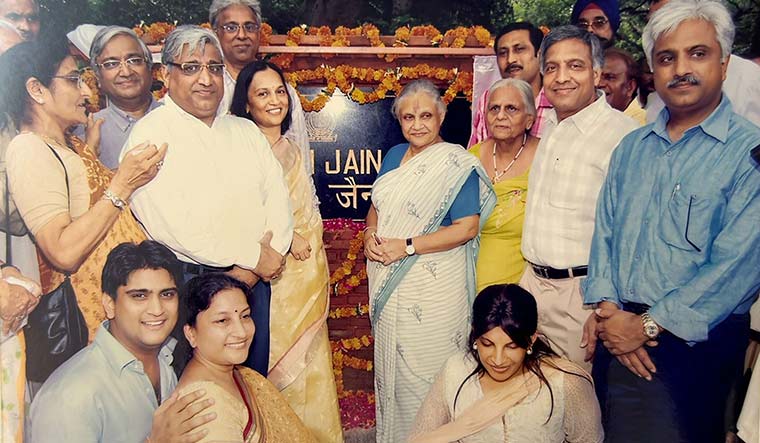In 1970, when Bhiku Ram Jain entered into an agreement to buy a house in Civil Lines from Anis Ahmed Rushdie, he was already an established and well-known politician in Delhi. The Rushdies, on the other hand, were a prosperous yet relatively low-profile family. It was a time when Jain was consolidating his presence in the national capital and Anis was seeking to diminish his Delhi connection. It was also a time when Salman Rushdie, having discovered his calling, was still in the process of finding his moorings and inspiration as a writer.
Like Anis, Bhiku Ram lived with his joint family in Old Delhi. The Jains had a house in Sadar Bazar and were business people, mainly dealing in automobile spare parts. They moved to Civil Lines in 1960, where Bhiku Ram shared a house with his brother. But the family was large and the space was inadequate. Bhiku Ram had two daughters and five sons, and his brother A.P. Jain had three daughters and a son.
Bhiku Ram went house hunting, and got in touch with Anis. Naren Bhiku Ram Jain recounts the meeting Anis had with his father at their Civil Lines residence―49 Bhiku Ram Jain Marg―a stone’s throw from the Rushdie house. The road, of course, was named after Bhiku Ram much later and was earlier known as Rajpur Road.
“I still remember that meeting which took place in my father’s study. After the meeting, we walked up to the suit property, which was about a hundred yards away,” said Naren.
The 1970s, the decade that saw the beginning of the legal fight over the Rushdie house, was also a time when Bhiku Ram firmly established himself as a business leader and was ascending the political ladder.
“The lawns of this house have witnessed many august gatherings,” recalled Naren. “My father was an important Congress leader, and he was also a leader in the business fraternity and a respected member of the Jain community.”
He rattled off names of dignitaries who visited his house: former prime minister Manmohan Singh, former president A.P.J. Abdul Kalam, former chief ministers Sheila Dikshit, Madan Lal Khurana and Sahib Singh Verma.
Naren’s brother Arvind and his family live in the house in question at present. “Our children grew up in this house and got married here,” said Naren. “Our grandchildren now play in these lawns.”
The Jains trace their ancestry to Garhi Harsaru village, located between Bhiwadi and Pataudi in Haryana. Naren said the family had huge tracts of land in the area, and some of it was later donated to build a school and a post office. Bhiku Ram’s father had come to Delhi in 1890, and for many decades, the Jains lived in Sadar Bazar.
The ancestral home of the Jains in Sadar Bazar was later donated to the Municipal Corporation of Delhi (MCD) to run a child and maternity welfare centre.
In 1930, Bhiku Ram was appointed secretary, City District Congress Committee of Delhi. He was active in the freedom struggle and went to jail, too. In 1945, he was elected councillor in pre-independence MCD. In 1980, he was elected to the Lok Sabha from Chandni Chowk. He held many posts in the Congress party.
Naren describes himself as a man of many interests. He says he is a politician, social worker, green revolutionary, artist, all in one breath. Naren was a member of the Congress and later became associated with the Aam Aadmi Party. He says Arvind Kejriwal used to come to his house next door for meals on weekends regularly. “Now, of course, he does not. He is an important man,” he said.
After parting ways with the AAP, Naren got associated with the Azad Samaj Party of dalit leader Chandrashekhar Azad. A few months ago, he was at the Union home ministry with a representation for enhancing the security of Azad as shots were fired at him.
Besides business and politics, he is active in theatre, where he goes by the name ‘Ubuntu’, an African word which means, “I am because we are”. He has a deep interest in paintings, is an art curator and organises exhibitions.
Naren has written a book about his father’s legacy―Bhiku Ram Jain, Ek Jivan Itihas―which was released by prime minister Manmohan Singh.
The legacy of Bhiku Ram continues to be an overarching presence for the Jain family. The legal fight over the Rushdie house is an important aspect of it.


